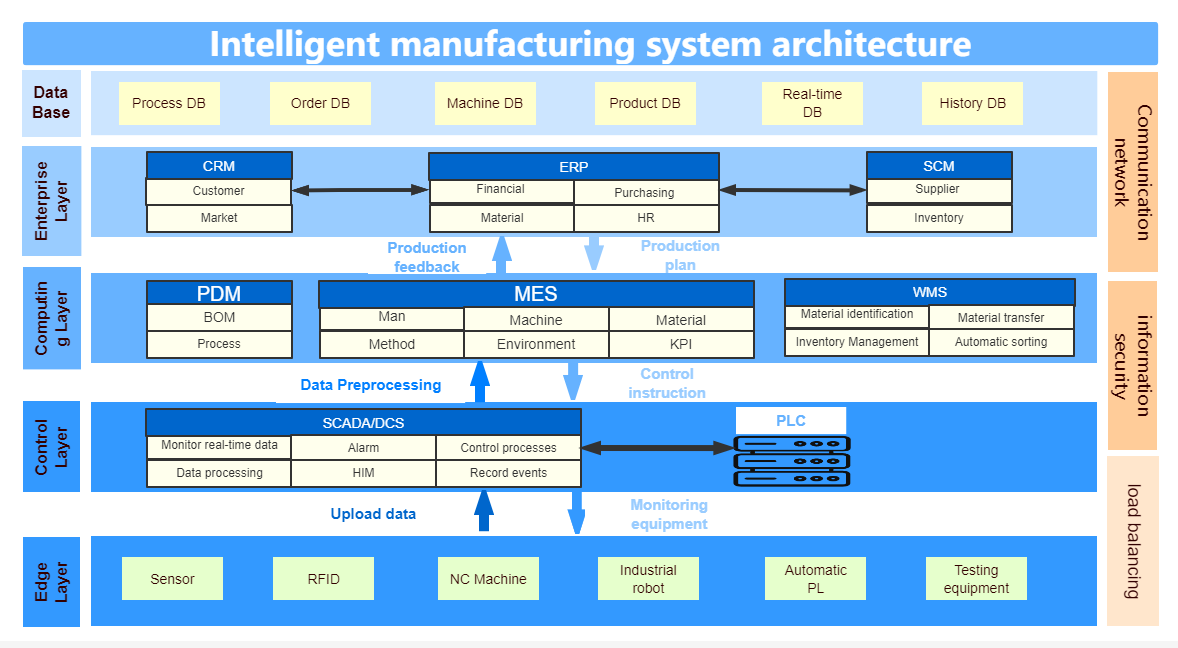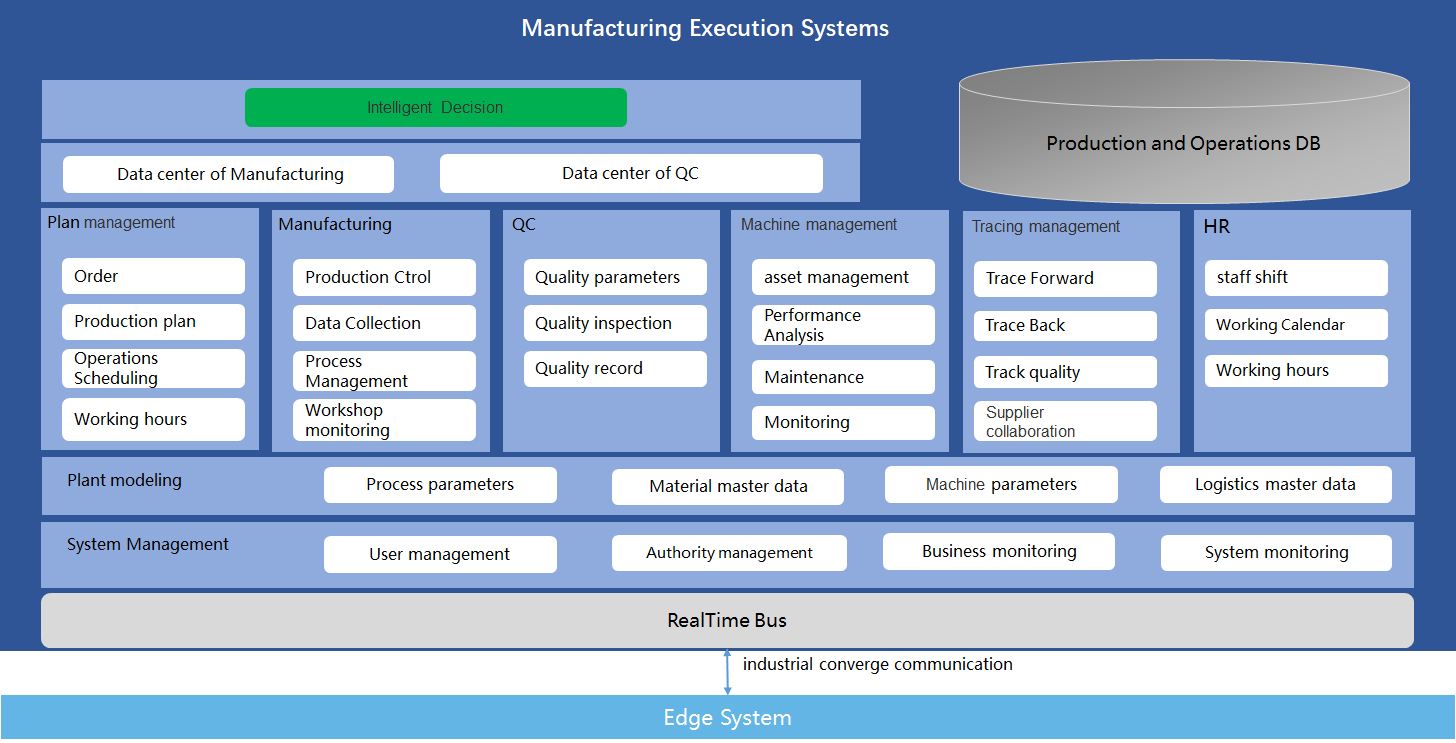Resource
Contact
Achieve fully digitalized intelligent manufacturing --- RayooTech’s MES IT service product
In 2010 the German government officially launched ten future-projects themed "High-Tech Strategy 2020", among which Industry 4.0 is of considerable importance. Following this global trend of industrial reform, the Chinese government has expressed proactive attitudes and employed prompt and substantial measures to catch up, for example, two critical official guidelines have been brought to industry attention: "Guiding Opinions on Deepening the Development of Manufacturing and Internet Integration" and " Development Outline of made-in-China in 2025 ". Both of the official documents revealed that the Chinese government is striving to develop advanced manufacturing and promote manufacturing transformation and upgrades; Both efforts denote the universal future tendency of the manufacturing industry in China. From a global perspective, the scale of manufacturing industry is gigantic.
Even though most of manufacturing companies have accumulated years of manual experiences, there is still a lack of a complete data reference system. Most traditional small and medium-sized manufacturing companies do not have a clear understanding of "advanced manufacturing", "Go to online platform" and other major trends, therefore they fail to notice the pressing need of manufacturing transformation. Unfortunately, they still rely on their outdated manufacturing experiences to stick to an insignificant market in the digital economic era.
Intelligent Manufacturing Capability Maturity Model
Intelligent manufacturing maturity level is not only the degree to which intelligent manufacturing is currently implemented in a given enterprise, but is also the result of a intelligent manufacturing evaluation. The intelligent manufacturing capability maturity model is divided into 6 levels as follows:
| Level 0-Lack of informatization: At this level, the company does not have any intention to implement intelligent manufacturing, and has not arranged any plan regarding the application of informatization. This is a stage of purely manual operation, in the meanwhile, the business does not possess any infrastructure or conditions of informatization or intelligent application. |
| Level 1-Plans Launched: At this level, the company has the aim of implementing intelligent manufacturing and has commenced planning and investment. Certain but not all core manufacturing elements have been equipped with business processes informatization. With fragmentary conditions permitted to meet the requirements of the infrastructure for the future’s communication and integration, the enterprise has begun to conduct manufacturing activities based on IT. Nevertheless, it only possesses the basic requisites for implementing intelligent manufacturing and has not yet fully entered the realm of intelligent manufacturing. |
| Level 2-Standardization: At this level, the company has planned to implement intelligent manufacturing, invested in equipment and systems which support the core businesses, and via technological transformation, ensured the main equipment have the ability to collect data and communicate, achieve core business automation and digital upgrade. Part of the information systems which support production operations can be integrated internally, data and information is shared among corporal departments, and the enterprise begins to enter the threshold of intelligent manufacturing by means of developing standardized interfaces and data formats. |
| Level 3-Integration: At this level, the enterprise begins to invest in intelligent manufacturing, transitioning from the incomplete investment in infrastructure, production equipment and information systems to integrated implementation. Key manufacturing operations, production equipment, and production units have undergone complete digitalization and network transformation, which foster the integration of information systems among core businesses such as design, production, sales, logistics, and service. The enterprise has focused on data sharing within the factory. The company has completed the preparations for intelligent upgrade. |
| Level 4-Optimization: At this level, the production system, management system, and other support systems within an enterprise have been fully integrated, meanwhile factory-level digital modeling has been completed. Moreover, the enterprise has embarked on analysis of data collected from personnel, equipment, products, and the environment, as well as the data formed in the production process. Following the optimized the production process and business process induced by tools such as knowledge banks and talent pools, interaction between the information world and the physical world has been activated. The transition from level 3 to level 4 demonstrates a phase with breached boundary between quantitative changes and qualitative changes, during which the company’s intelligent manufacturing capability improves rapidly. |
| Level 5-Leadership: Leadership is the highest level of intelligent manufacturing capacity construction. At this level, the data analysis and usage has penetrated all aspects of the enterprise, and various production resources have been optimally utilized, autonomous feedback and optimization between equipment has been available, the enterprise has played a vital role in the upstream and downstream industrial chain. Personalized customization, network collaboration, and remote operation and maintenance have become the main business models for the enterprise, which has also become the benchmark in a given industry’s intelligent manufacturing. |
RayooTech Intelligent Manufacturing IT Service Digital Platform
RayooTech’s intelligent manufacturing IT service is based on self-developed MES software products as the core service products, and expand to the entire intelligent manufacturing digital platform.

RayooTech MES IT Service Product
RayooTech developed our MES IT service product around five elements of " Man, Machine, Material, Method, and Environment" in manufacturing. We should not only meet the basic functions as production planning, order management, production sequencing, ANDON alarm, process management, printing management, production reporting, production monitoring, quality management, production traceability, and other future business needs that include collaborative management, equipment management, human resource management, BI data analysis and decision-making, etc., which will facilitate full control of the entire business in the future. The overall business architecture diagram is as follows:

The advantages of RayooTech MES IT service products are as following:
1. High degree of integration, no additional interfaces are required between the modules of the system;
2. The least software development workload;
3. The system has high reliability and sufficient security to meet the security requirements of all levels of business;
4. Advancement and integrality, able to support the implementation of the most advanced modern management ideas and theories in all aspects of the enterprise;
5. Mature MES software has already contained industry experience and standards;
6. Openness and scalability, in line with the development trend of information technology, not only provides the latest version, but also facilitates future upgrades and function expansions;
7. The system has the function of flexibly defining the process (workflow) to ensure that the company's process changes after the implementation of the system is possible to redesign the process;
As an enabler of enterprises’ upgrade, RayooTech stands on the united front with many manufacturing companies, and is committed to providing enterprises with efficient IT services, and working together with them to transform from traditional manufacturing models to intelligent manufacturing, and comprehensively improve their production efficiency and continuously improve the competitiveness of enterprises in the international market.




